War Stories and Advice from the Archive’s Outgoing FOIA Director
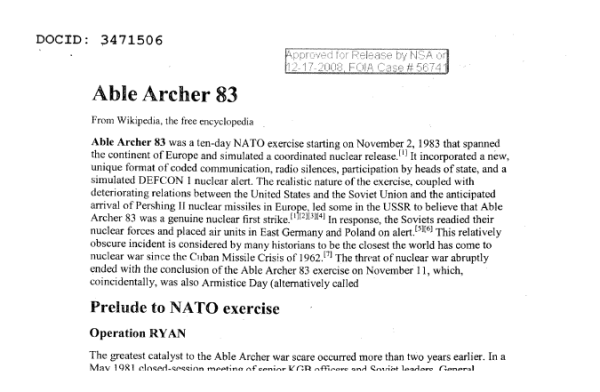
A result of an early FOIA request. The National Security Agency classified a wikipedia article, reviewed it, and charged me before processing it for release. I’ve had more success since.
A few war stories and bits of advice before I leave my job as Director of the FOIA Project at the National Security Archive to begin a new role as the FOIA Director for the Washington Post:
If the Reagan Presidential Library had just given me the darn document, I wouldn’t have helped file tens of thousands more FOIAs over the past ten years. When I was a college student writing my thesis on the 1983 Able Archer War Scare, I used some of my Christmas money to travel to the Reagan Presidential Library to do research. I found some interesting documents there, to be sure, but most of the folders that had titles relevant to my research had no documents inside, just lists of “closed” files. I, disappointed, sheepishly asked an archivist if there was anything, I could do to see these files. He said, with a half-annoyed and half-pitying look, “I guess file a FOIA[1] and wait.”
As it turned out, this was one of the best things that could have happened to me. Instead of becoming dejected, I became angry. I researched the Freedom of Information Act, including how to fight delays and denials and came across guidance from the National Security Archive. Even more importantly, I was blown away by just how awesome the National Security Archive was! How cool would it be to work here!?
Eventually, after a few tries, I was hired as an intern (I cornered the previous FOIA director at a party until she agreed to accept my resume. How DeeCee). I started by scanning declassified documents into our system as they came in. Before too long, I climbed the ladder to work for luminaries Jeff Richelson and Matthew Aid. And then, in a few years, I was overseeing the entire FOIA project and was Editor of the Archive’s blog Unredacted where I had the pleasure of producing a good run of “Document Fridays” (One of which, recently updated, about State Department reporting on the kidnapping of then-Washington National Wilson Ramos). I FOIAed, won the release of, and wrote up lots of documents. All my writing was helped by two of the best editors imaginable, Tom Blanton and Malcolm Byrne; it’s a real treat to write with them. Off the top of my head, a few of my favorites include:
Oh yeah, also that time the CIA paid the National Security Archive a settlement $350,000 for violating FOIA and we got the internal dox about their anger at doing so!
But we didn’t just win historical revelations. We also affected current policy. I helped author eleven FOIA Audits. Largely due to my colleague Lauren Harper’s excellent FRINFORMSUMs (Freedom of Information Summaries—a nod to less open intelligence reports), Unredacted became a very important news source for all Open Government and FOIA news. A few of our pieces even had an impact on improving FOIA and ultimately helping to get a pretty good FOIA Improvement Act Passed. I’m most proud of:
The Next FOIA Fight: The B(5) “Withhold It Because You Want To” Exemption
FOIA: A Colossus Under Assault and
The “Indiana Jones Warehouse:” How to use FOIA to get Documents from Purgatory
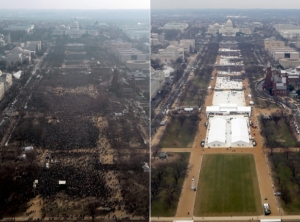
A FOIA request to the National Parks Service revealed the president of the United States lied about his crowd size.
And, speaking of the FOIA Improvement Act, I’d like to pay an homage to the late great Chairman Elijah Cummings. In my first testimony to Congress, I made some good points, but, probably hotheadedly, bemoaned that Congress was not doing enough to fix FOIA faster. He gave me a tongue lashing, overviewing the power of FOIA telling me, “not to throw the baby out with the bathwater.” It’s an admonition I’ll be forever proud to carry.
And what about those 1983 War Scare FOIAs? Well, National Security Archive won the release of the key, chilling document, a 100-page comprehensive President’s Foreign Intelligence Advisory Board report that concluded the danger was real in 2015. The release came after a twelve-year fight involving FOIA, MDR, and the Interagency Security Classification Appeals Panel. And—proving the FOIA gods have a sense of humor—was released to me on my birthday. Eventually, this and other War Scare
documents became a book. And the Able Archer 83 Sourcebook remains the most comprehensive resource of declassified American, Soviet, and Warsaw Pact dox to this day.
As a fellow at the National Security Archive, I’ll continue to research this topic and fight for the release of still-secret sources, including General Perroots’s firsthand warning of the danger he experienced during the nuclear exercise and the Initial British reporting, entitled ”The Detection of Soviet Preparations for War Against NATO.”
Finally, as I leave the best job I’ve ever had to become the Washington Post’s FOIA Director, I’d like to give a bit of final advice to the FOIA warriors out there (in addition to my maxim: “ALWAYS APPEAL.” –see more general filing tips here at ever-awesome Muckrock).
First, get to know your counterparts within the government. Some of the most rewarding experiences I’ve had were swapping stories with FOIA processors at the American Society of Access Professionals, doing deep dives into records policy with the staff of the US National Archives and Records Administration, and serving with governmental and nongovernmental experts on the Federal FOIA Advisory Committee. My largest take away from my colleagues within the system is that most absolutely believe in open government and want to get the records out. The problem, as they see it, is lack of resources. I completely agree with them! But I also point to another problem, that I think some of my government colleagues have begun to come around to: the extreme inefficiencies within the FOIA processing system. Yes, fund FOIA better! But the more actionable solution, I believe, is confronting the multitude of FOIA processing inefficiencies and remedying them. Two of my favorite solutions that the FOIA Advisory Committee recommended to do this are to update the FOIA fee regs (written before the advent of email)[2], and for agencies to fix the largest reason for FOIA delays, inefficient searches.
Second, those who want to see FOIA improved should apply as much pressure as possible on the Department of Justice Office of Information Policy to do so. It has more capacity and authority than any other agency. But, as the Archive has written, the two-time Rosemary Award winner, has not lived up to its tasking. The greatest disappointment in my tenure at the National Security Archive was watching President Obama’s day one directive to improve FOIA practices, and his directive for every agency to cut its FOIA backlogs by ten percent each year be ignored by the Department of Justice Office of Information Policy, and in turn, the FOIA shops throughout government. Imagine what a great position we would be in if agencies had completed the President’s crystal clear, manageable instruction to reduce their backlogs by ten percent for eight years in a row. It’s a sad missed opportunity to think about. In retrospect, President Obama’s greatest FOIA failing was not ensuring the Department of Justice Office of Information Policy followed his marching orders to improve FOIA. Hopefully, this error is a teachable moment that a future administration that also cares about improving FOIA will not repeat.
Finally, I’d recommend FOIA advocates not tinker around the edges as they work to reform FOIA. I think they should ask themselves: Does any proposed reform get more information to more people more quickly? If so, it is a worthy reform to fight for! If not, it may not be. The first worthy reform I’d recommend getting passed is the bipartisan FOIA-lion-approved quick fix to return to the status quo balancing test after the Supreme Court’s Exemption Four overstep. (The Court cares about the “plain text meaning” of the word “harm” in the business-protecting Exemption Four, but not about the words “shall make the records promptly available” in the statute?!?!) Another larger fight I’d recommend is the inclusion of a provision allowing FOIA personnel access to agency electronic records so that they can search them in response to FOIAs, rather than waiting for their busy colleagues to take years, or decades. And a final, next frontier fight is a universal public interest balancing test, as was introduced in Senator Warren’s Anti-Corruption and Public Integrity Act. Despite the order, still on the books, that they should not withhold information because they merely technically “may do so legally,” agencies are still largely withholding anything and everything they can (among watermelon production data and other stupid secrecy). The next step is enshrining in legislation the public’s right to some information, even if it technically falls under one of FOIA’s exemptions. I know that these battles will be fought by zealous right to information warriors.
As I told my esteemed colleagues at National Security Archive, this is a see you soon, not a good bye. I’ll remain a research fellow here, and will be knee and elbow deep in FOIA at the Washington Post.
So…. See. You. Later.
[1] Most Presidential Library records are released via Mandatory Declassification Review (one of my very first blog posts!!), not the Freedom of Information Act.
[2] Cause of Action has just filed a lawsuit fighting to do just this!
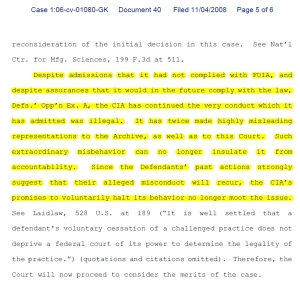
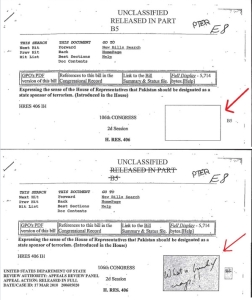
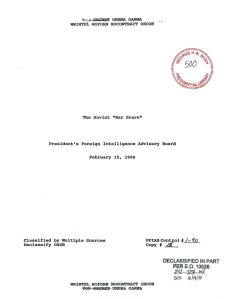

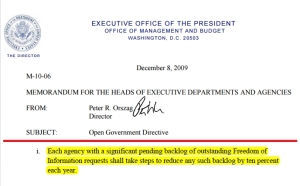

Comments are closed.